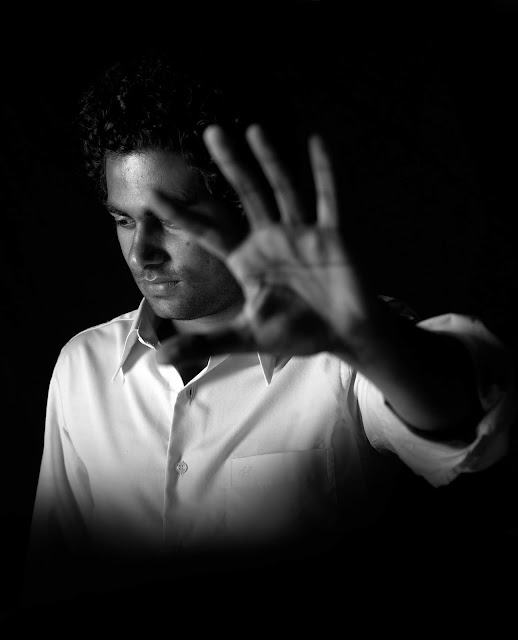 |
| Schizophrenia is a severe and enduring mental illness that interferes
with normal brain functioning. Schizophrenia most commonly strikes
between the ages of 16 and 30 and symptoms shows comparatively earlier
in males than females. Photo from MentalHelp.net |
May 24 is celebrated the world Schizophrenia day to raise awareness of the disease that is one of the 10 causes of disability. Interestingly the medical data shows that about 90 percent of people with untreated schizophrenia left untreated in developing countries. Dr Manu Tiwari, senior psychiatrist of Fortis Healthcare says,
Hopelessness, social isolation, hospitalization, deteriorating health after a high level of premorbid functioning, recent loss or rejection, limited external support and family stress or instability are risk factors for suicide in patients.
What is Schizophrenia ?
Schizophrenia is a severe and enduring mental illness that interferes with normal brain functioning. Schizophrenia most commonly strikes between the ages of 16 and 30 and symptoms shows comparatively earlier in males than females. It causes affected people exhibit odd and often highly irrational and disorganized behavior. In many cases, the disorder develops so slowly that the individual does not even know that they have had it for many years. But in other case it can strike suddenly and develop quickly. The illness may also have its onset in 40s and above, termed late-onset schizophrenia. The illness is characterized by disruption in the process of perception of senses, especially hearing and also thinking.Symptoms of Schizophrenia
Some patients may show clear symptoms but others may seem fine until they start explaining what they are truly thinking. A sizable proportion of people with schizophrenia are dependent on others because they are unable to do a job and take care for themselves. |
Some patients may show clear symptoms but others may seem fine until they start explaining what they are truly thinking.
Photo by Ibrahim Rifath on Unsplash |
Many of them resist to visit a doctor and arguing that there is nothing wrong with them.
Commonly, people with schizophrenia have anosognosia or lack of insight. This means the person is unaware that she/he has the illness, which can make treating or working with them much more challenging.
The effect of schizophrenia is very critical for the patient as well as family, friends and society also.
 |
Suspecting without sufficient basis - that others are exploiting, harming or deceiving her/him
Photo by Christopher Campbell on Unsplash |
Antagonism > Suspeciousness
Suspecting without sufficient basis - that others are exploiting, harming or deceiving her/him
Dis-inhibition >
Distractibility
Difficulty in concentrating and focusing on tasks; attention easily diverted by extraneous stimuli
Decreased Intellect
Perceptual Dysregulation
- Odd and unusual thought process and experiences
Unusual Belief and Experiences
- Firmly held very strange false beliefs, unreal perceptions, imaginary voices, visions and smells
Eccentricity
- Odd, unusual strange behavior, appearance or talking, bizarre thoughts
Lack of Insight
- Lacking understanding of or willingness to change / correct their personal problems
Forgetfulness
- Difficulties in learning, forgetting important information.
Impaired Reasoning
- Lacking good judgement, impaired ability to solve problems by thinking logically and in a sensible way.
Detachment
Intimacy Avoidance
- Avoidance of close relationship
Social Withdrawal
- Preferred to be alone; avoidance of social contracts and activity
Restricted Emotion
- Little reaction to emotionally arousing situation; constricted emotional experience and expression
Loss of Interest or Pleasure
- Inability to enjoy or take interest in things; lack of energy for life's experience
Negative Emotion
Depressed Mood
- Feelings of being down, miserable and hopeless
Self-Harm
- Suicidal thoughts or risk of harming self by self-injury or severe self-neglect
Symptoms and signs however varies in a range depending on the individual.
Psychosis
Schizophrenia or paranoid schizophrenia is technically featured as psychosis. It occurs when a person loses the ability to discriminate between real and imagined experiences and therefore contact is lost with external reality. |
Photo by Randy
Jacob on Unsplash
|
Hallucination
Perceiving a sensation, usually hearing multiple voices that occur in the absence of anyone around is termed as hallucination. The voice quality is like that of a normal person but the only difference is that this happens in the absence of any real person speaking. Therefore for the person with schizophrenia, such voices are real. These voices could be abusive and hostile causing irritability. The person - because of preoccupation with voices - will not able to concentrate and have a social interaction. The person rarely complains of hearing voices as abnormal and does not believe their origin is from an ill mind. There is abnormality of experience of thinking also, as the person believes she/he is being conspired against with people watching or following them. Some patients have isolated themselves because of fear when severity of illness increased. The voices also could command to harm oneself or others and the person may act on those instructions. In simple terms some of these experiences are similar to dreams but with person being fully awake and alert. |
Photo by Aiony Haust on Unsplash
|
Delusion
With hallucination these patients also experience delusions which are firmly held false beliefs, mistaken ideas that are not supported by evidence or held despite contradictory evidence. Delusions are necessarily in congruent with societal norms and some beliefs may constitute a delusion in certain cultures where they impact functioning while they may be perfectly normal belief in others.Both hallucination and delusion are involuntary in nature, occurring spontaneously and without premeditation on the part of patients who experience them. Typically, attempts to correct patients' delusions are met with resistance and defensiveness. From their internal perspective, patients' delusions seem to be true.
Persons with schizophrenia have little choice but to take their hallucinations and delusions seriously as their malfunctioning brains cause them to experience these uncontrollably with the force of real sensations.
Hallucinations are thus a virtual reality that persons with schizophrenia force themselves into the trap and the delusions that form around these hallucinations are a natural response to this unintentionally altered perceptions.
Causes of Schizophrenia
There are may be various causes that can be identified as possible cause when a person affected by the symptoms of schizophrenia. However those causes are only possibilities based on historical analysis.
Genetic inheritance
Schizophrenia is not just caused by just one genetic variation, but a complex interplay of genetics and environment. But if there is no history of schizophrenia in a family, the chances of developing it are less than 1 percent, However it is found that the risk rises to 10 percent when a history conforms.Environment
There is no definite proof but different studies suspect trauma, exposure to viruses, malnutrition before birth may contribute to increase the possibility of developing schizophrenia.Chemical imbalance in the brain
Problems with certain brain chemicals including neurotransmitter called dopamine and glutamate may contribute schizophrenia.. Other neurotransmitter like serotonin may be one of them.Substance use
Some experts have suggested that taking mind altering drugs during teen and in early 20s can increase the risk of schizophrenia.Cause or Effect
Stressful experiences often precede the emergence of schizophrenia. Before
 |
It is very hard to conclude whether schizophrenia is cause or effect of the crisis.
Photo by Gabriel Matula on Unsplash |
The above factors with some unknown causes often blamed for the onset of schizophrenia, when it was really other way round - disease causes the factors. Therefore it is very hard to conclude whether schizophrenia is cause or effect of the crisis.
Treatment of Schizophrenia
There is no full cure of schizophrenia so far, however it can be treated and manged several ways. Psychiatrists generally do attempt to treat patient with family members, help at home and do try the least restrictive approach but it all depends on the severity of the illness, level of trust and family support.
By starting treatment early with proper combination of
- medication
- psychological counseling
- self-help resources
Final Thought
The primary schizophrenia treatment is medication. Unfortunately it needs long-term treatment, most cases lifelong. though some people make significant recovery.
 |
Photo by Cristian
Newman on Unsplash
|
Many symptoms can be treated or controlled. The focus switches from treating the illness to recovery phase, to make the person lead a more independent life by way of rehabilitation care.
Since most persons do not believe they are ill, they refuse to take medications that are necessary to reduce their strange experiences. It is the trusting therapeutic relationship with the regular psychiatrist and presence of the motivating care-giving family member that will ensure the treatment is adhered to. With many awareness programmes, caring family members and even at times the persons themselves are now coming forward and seeking treatment and continuing care.
















